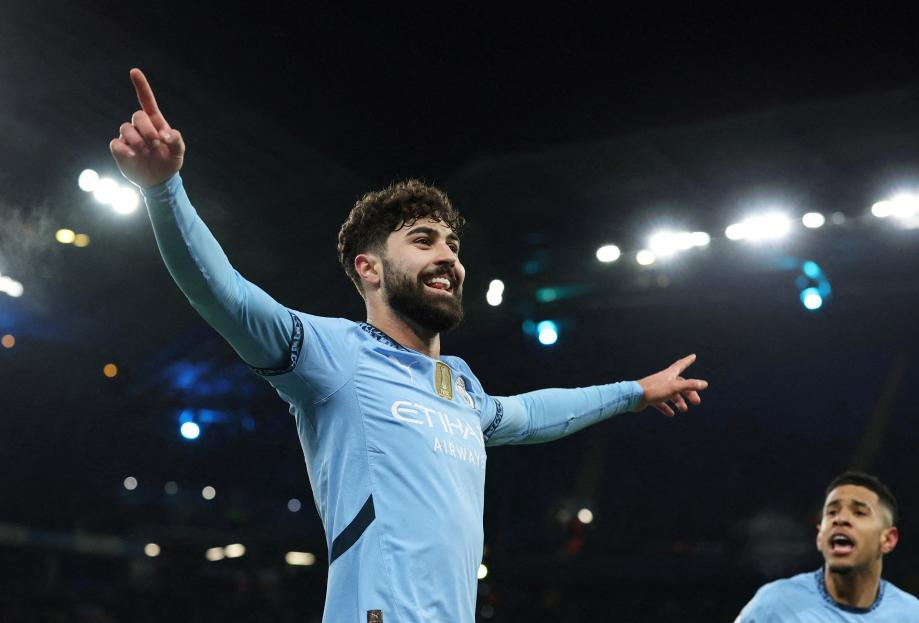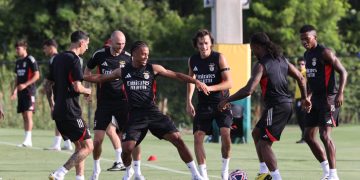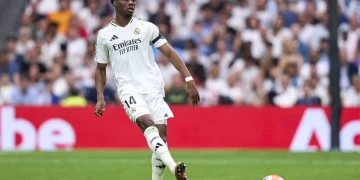Introduction:
Manchester United, one of the most successful and globally recognized football clubs, has experienced a mix of highs and lows in recent seasons. The 2024/2025 campaign marked another chapter in their post-Sir Alex Ferguson era, as they aim to re-establish themselves as one of the dominant forces in English and European football. After a tumultuous few years following Ferguson’s departure, Manchester United made significant strides under Erik ten Hag, securing a top-four finish in the Premier League and winning the 2023 Carabao Cup.
With high expectations surrounding the team, the club’s fanbase has eagerly awaited the start of the new season. After bolstering their squad with key signings and focusing on developing a cohesive tactical approach, the question now is whether Manchester United can meet their goals for this season — both domestically and internationally.
In this article, we will delve into Manchester United’s performance in the current season, analyzing their key matches, player contributions, and tactical evolution. We will also assess whether they are on track to meet their ambitious targets, including finishing in the Premier League top four, progressing deep into European competitions, and contending for silverware in domestic cups.
Section 1: Overview of Manchester United’s Season So Far
- Pre-season Expectations: Heading into the 2024/2025 season, Manchester United had clear objectives. After a successful campaign in 2023/2024 where they finished third in the Premier League and qualified for the Champions League, the club was expected to build on this momentum. United’s goals were to challenge for the Premier League title, go deeper into the Champions League, and win another domestic cup — a feat they achieved last season in the Carabao Cup.
- Key Signings: United strengthened their squad in the summer transfer window, making strategic signings to address areas of need. One of the most notable arrivals was Brazilian forward Raphinha, who joined from Barcelona to add width and creativity to the attack. Additionally, Kim Min-jae was brought in to bolster the defense, adding both experience and composure to the backline. With these new additions, United’s squad depth and quality have significantly improved, making them a more competitive side both in domestic and European competitions.
- Early Season Form: As of mid-season, Manchester United’s performances have been a mixed bag. The team has shown glimpses of brilliance, but inconsistency has been a major issue. Victories over mid-table teams have been expected, but they have struggled against the top-tier clubs, which is a major concern for their title aspirations. A few notable draws and narrow losses have dropped points in crucial matches, leaving the team in a competitive, but not commanding, position in the Premier League. In European competitions, United has shown promise in their group stages but faced challenges when pitted against higher-quality opponents. Their performances in the Champions League and Europa League will be pivotal in determining whether they can make a deep run and challenge for the ultimate prizes.
Section 2: Key Players and Their Impact
- Bruno Fernandes: As the club’s captain and talismanic playmaker, Bruno Fernandes has been central to Manchester United’s success. His vision, creativity, and leadership have been key in orchestrating United’s attack. Fernandes has been involved in most of the team’s goals, contributing both assists and scoring regularly. His ability to dictate the tempo of the game and deliver quality set-pieces remains crucial.
- Impact on Performance: Fernandes’ form has been vital to United’s attacking fluidity. However, when he has been off his game, the team has sometimes struggled to break down defenses or create clear chances, highlighting the dependence on his creativity. His performances will be decisive in whether United can keep up with the best teams in the league and Europe.
- Marcus Rashford: The club’s primary attacking threat, Marcus Rashford, has continued to build on his excellent form from the previous season. His pace, technical ability, and knack for scoring crucial goals make him one of the most dangerous forwards in the Premier League.
- Challenges and Adaptation: However, like many of his teammates, Rashford has experienced inconsistency at times, failing to convert opportunities in some high-stakes matches. United’s reliance on Rashford for goals means that his form will heavily influence the club’s overall attacking efficiency.
- Casemiro: The Brazilian defensive midfielder Casemiro has been instrumental in United’s midfield, providing both defensive cover and a calming influence on the ball. His ability to break up opposition attacks and protect the backline has been essential for United, especially in difficult matches where control of the midfield is paramount.
- Impact on Team Balance: When Casemiro is fully fit and performing at his best, United looks much more balanced and compact. His experience is invaluable, but injuries and suspensions have at times forced United to adjust their tactics, which has affected their overall defensive solidity.
- Raphinha: Having made an immediate impact since his arrival, Raphinha has been crucial in providing width and flair in United’s attack. His dribbling, vision, and ability to cross the ball into dangerous areas have added a new dimension to the team’s play. Raphinha’s direct style of play has complemented Rashford’s runs, giving United a more varied and dangerous attack.

Section 3: Tactical Evolution Under Erik Ten Hag
- Building on the Pressing System: Erik ten Hag has instilled a strong pressing system at Manchester United, similar to what he implemented at Ajax. The team presses high when out of possession, with the aim of winning the ball back quickly and creating opportunities in transition. This high-intensity pressing style has led to some dominant performances against lower-ranked teams but has also exposed vulnerabilities against sides with strong ball control.
- Defensive Organization: Ten Hag has worked hard to improve United’s defensive structure, focusing on organization and discipline. The introduction of Kim Min-jae has provided additional stability to the backline, alongside Raphaël Varane. However, United’s defense remains a work in progress, particularly in terms of dealing with crosses and aerial duels. The full-back positions, in particular, have seen some inconsistency, with Luke Shaw and Diogo Dalot often caught out of position in defensive transitions.
- Control in Midfield: United’s midfield has become more compact under Ten Hag, with a stronger emphasis on ball retention and controlling the pace of the game. However, against the best teams, the midfield has occasionally been overrun, particularly when facing teams that dominate possession. The combination of Casemiro, Bruno Fernandes, and Christian Eriksen offers creativity and defensive stability, but this trio is sometimes caught out by quicker transitions from opposition teams.
- Set-piece Improvements: One notable change this season has been Ten Hag’s focus on set-piece strategies. United has scored several goals from set-pieces this season, something that was lacking in previous years. Whether from corners or free kicks, United has become more dangerous in dead-ball situations, which adds another weapon to their attacking arsenal.
Section 4: Can Manchester United Achieve Their Goals This Season?
- Premier League Title Challenge: As of mid-season, Manchester United is in the race for the top four, but they seem to be lacking the consistency needed to challenge for the Premier League title. They have shown quality in spurts, but inconsistent results against top-six rivals and underwhelming performances against lower-ranked teams have undermined their ambitions for the championship. However, with a strong second half to the season, a top-four finish is still within reach.
- Champions League Ambitions: In the Champions League, Manchester United has shown potential but has also faced challenges against elite European sides. If they can find consistency and improve their performances in key games, particularly in knockout rounds, they could make a deep run. Advancing past the quarterfinals would be a significant achievement and is certainly an achievable goal for Ten Hag’s side.
- Domestic Cup Runs: United has the squad depth to challenge for domestic cups like the FA Cup and Carabao Cup. Last season, they won the Carabao Cup, and this season they will look to replicate that success. Their squad is strong enough to compete on multiple fronts, but their success in cup competitions will depend on squad rotation and keeping key players like Rashford, Fernandes, and Casemiro fit for the crucial stages.
Conclusion:
Manchester United’s performance this season has been marked by flashes of brilliance tempered by inconsistency. While the team has made noticeable improvements under Erik ten Hag, especially in terms of tactical organization and squad depth, they are still a work in progress. Key players like Fernandes, Rashford, and Casemiro continue to be pivotal to the team’s fortunes, but the team needs to find greater consistency in order to challenge for the Premier League title and make a serious push in the Champions League.
The potential for success is there, but achieving the club’s ambitious goals this season will require overcoming some tactical and mental hurdles. As the season progresses, Manchester United’s ability to adapt, improve their performances against top-tier opponents, and maintain fitness levels will determine whether they can realize their aspirations of domestic and European success.






























Discussion about this post